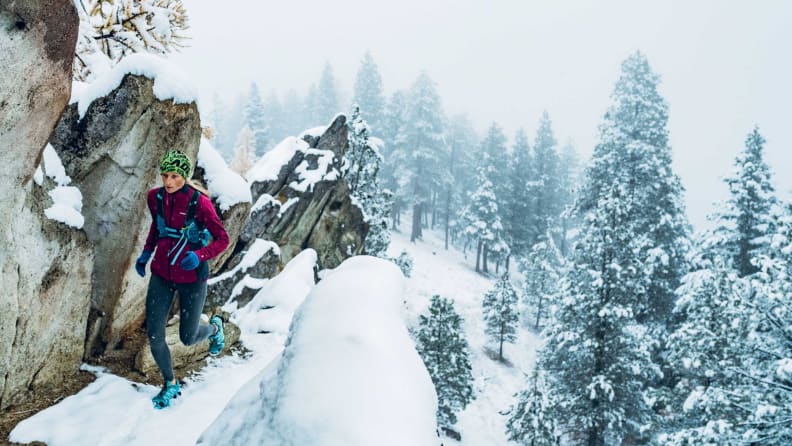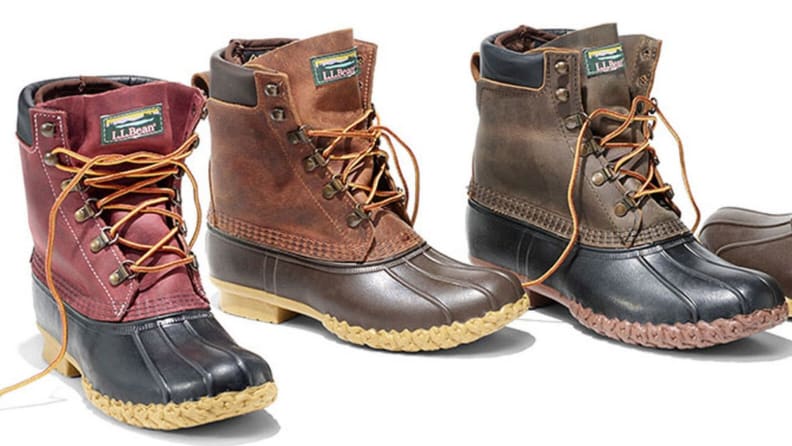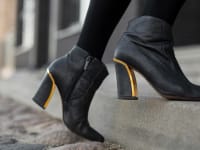Here's what to wear for any outdoor winter activity
Materials matter when you're going to break a sweat in cold weather.
Products are chosen independently by our editors. Purchases made through our links may earn us a commission.
It's one thing to dress for the cold when you just have to go out in it to get the mail or to transition from your heated car to a heated building. But when you plan to be active outside—whether walking the dog, shoveling snow, or hiking or skiing—getting dressed is a whole other thing. You aren't just layering up for warmth: As you move around, you may also break a sweat, even in sub-zero temps. Without the right gear, that could leave you feeling cold and clammy, and even at risk for hypothermia.
Here are the must-haves in any layering set for anyone who will be active outside in the winter.
1. Breathable but warm socks

Wool socks from DarnTough and synthetic socks from Balega are both warm and sweat-wicking.
When you sweat, your body is trying to cool itself down—but that sweat can make you colder if your garments soak up the moisture and hold it in instead of letting it pass through to evaporate. This is why it’s important to invest in a good set of base layers, or the clothing worn against your skin. You'll want ones made with wool—merino wool is the highest quality, and it won’t feel itchy—or synthetic materials, like nylon or polyester. And no matter your activity, everyone's winter wardrobe should start with socks.
Typically, you’ll be happiest with a pair of middle to thick-weight socks for the winter—middle-weight if you tend to run warm, thicker if your feet are always cold. We like Darn Toughs for a wool sock option; they’re durable, wick moisture fast, and have a lifetime warranty. And, unlike most wool socks, they don’t itch. Smartwool is also a good choice.
Synthetic socks are best for high-intensity activities where you might face added moisture, like winter trail runs. For those, we recommend the lightweight Balegas, or Eurosocks for snow sports.
2. Sweat-wicking base layers
In addition to socks, you should consider buying a set of base-layer tops and bottoms. Long underwear (also called long johns) or leggings will do the trick for keeping you warm under a pair of thicker, wind-blocking pants (more on that soon). And a long-sleeved base-layer top will quickly become a staple in your wardrobe; choose from quarter-zip or crew neck options.
Patagonia, Smartwool, and REI all make solid base layer sets, and each offers a variety of configurations, lengths, and sizes. Again, merino wool is the way to go for moisture-wicking warmth, but synthetic is a good option if you need something that dries quickly.
3. Extra-cozy middle layers

A fleece paired with a base layer may be enough to provide adequate warmth, depending on your activity.
Fleeces and soft shell jackets make for the best middle layers, because they add a bit of extra warmth without much bulk. If you run very warm, you may not need this middle layer; but on the coldest days or for people who run cold, this middle layer is a must-have.
We like the fleeces from REI, Patagonia, and Columbia best, but fleeces are pretty non-technical clothing items, so you shouldn’t worry too much about picking the “best in show”—almost any fleece option will do, as long as it gives you a little bit of extra coziness and fits over your base layer easily. One note: Fleeces are usually very breathable but they aren’t great on windy days, as the wind passes right through the open fibers and can leave you feeling chilled. On the other hand, a breathable fleece might be a good top layer if you'll be very active, such as when winter running.
Shop for fleece jackets on Amazon
4. Durable, weather-proof top layers
Sometimes you need a waterproof layer to keep precipitation from soaking in. A raincoat and rain pants will do just fine, especially if you live in a place where winters are more wet than cold. Try options from Marmot, Patagonia, REI, or Outdoor Research.
When it's windy, you’ll want a shell that blocks the wind. Many rain shells resist both water and wind, but you should check the hang tags beforehand to be sure that you’re really getting the protection you need. If your jacket or pants are feeling less waterproof than you’d like after a few seasons, consider re-upping the Durable Water Repellent (DWR) layer with Nikwax.
If you're in a cold and snowy environment, you’ll want an insulated shell, packed with down or synthetic fill, to keep you warm. Snow pants and ski jackets act as this kind of shell layer, as could puffer coats. However, some puffy jackets aren’t very waterproof, so you might need to throw a rain layer on top of that jacket—check the label before you buy.
5. Water-resistant, insulated footwear

The Duck boots from L.L. Bean offer a great mix of warmth and water resistance.
There’s nothing worse than soggy toes on a cold day, so choose your winter footwear wisely. Socks can take you 80 percent of the way, but you’ll still want to make sure you have insulated shoes that are moisture-proof (no leaking), comfortable for walking long distances, and contain some element of insulation. Be sure to try on your shoe choice with your ideal socks before buying; thicker socks can make your boots too tight, which can lead to unexpected chafing.
Some excellent city snow boots come from Sorel, Blundstone, and L.L. Bean. For winter adventures like snowshoeing, all-season waterproof hiking boots with extra-warm socks are a good combo.
6. The right accessories for your task at hand
Your winter gear kit is almost complete except for one final step: accessories! You’ll want to keep your head warm on cold days, so consider buying a warm hat made from merino wool. Beanies, headbands that cover your ears, or mountaineering caps are all a good idea. Mountain Hardware makes excellent winter hats, but the women’s winter hats from Everlane are a good choice, too, if you’re looking for something more fashion-forward.
Similarly, mittens can help you contain the heat in your hands; a good pair will come with liner gloves, which are like simple mittens, and an insulated, waterproof, down layer to pull on over the top as needed. Black Diamond, Marmot, and Dakine make great mittens and gloves for snow sports, and we love L.L. Bean and The North Face’s more stylish options. Scarves and net gaiters or buffs from the same brands are also important for keeping your neck warm during the coldest days.


